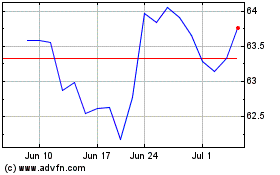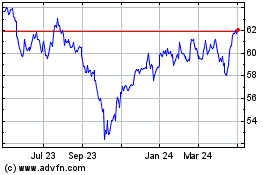By Mike Esterl and Jennifer Maloney
After a rocky eight-year run atop the world's biggest beverage
company, Muhtar Kent will step down as chief executive of Coca-Cola
Co. and hand the task of reviving sales growth to his top
deputy.
James Quincey, a 20-year Coca-Cola veteran who was appointed to
the No. 2 job last year, will succeed Mr. Kent in May. Mr. Kent,
who recently turned 64, will remain chairman of the $180 billion
company, Coke said. The transition had been expected though the
timing was uncertain.
Mr. Quincey, 51, who was born in Britain and spent most of his
career outside the U.S., takes over at one of the most powerful
global brands as it struggles with a consumer shift away from
sugary sodas. Coke's revenue has declined in each of the past three
years. Despite a diversification push into juices, bottled waters
and other beverages, soda still represents about 70% of company
sales.
One of Mr. Quincey's biggest challenges will be the increasing
number of governments weighing special taxes on sugary drinks amid
rising obesity and diabetes. The U.K. plans to introduce a levy in
2018, and countries including South Africa and Indonesia are
mulling similar steps. In November, five U.S. municipalities,
including Chicago's Cook County and San Francisco, approved
sweetened-drink taxes.
"We'd like to go faster" in diversifying beyond core soda
offerings that include Fanta, Sprite and the namesake cola, Mr.
Quincey said Friday. Coke is expanding its selection of low-calorie
and zero-calorie beverages, he said, and played down the prospect
that it would expand beyond beverages, as rival PepsiCo Inc. has
done. He said he still sees plenty of growth opportunities in soda
and other nonalcoholic drinks.
Mr. Kent has tried to boost Coca-Cola's profits by divesting
manufacturing and distribution in the U.S. and elsewhere to focus
on its higher-margin concentrate business. Coke has made a handful
of acquisitions of juice and dairy companies; last year, it bought
a 17% stake in Monster Beverage Corp., a leading energy-drink
maker.
But many investors have soured on the company. Coke's share
price has gained 24% over the past five years, less than a third of
the gain in the S&P 500. The stock rose 2.5% Friday to $42.
Mr. Kent won praise early in his tenure for boosting growth and
stabilizing the U.S. market. Many credited the strong operational
know-how he developed after starting with Coke in 1978. As CEO, he
continued to focus on the smallest details, keeping a red paint
chip in his wallet to make sure Coke trucks, packaging and store
signs were Coke red.
He also helped expand Coke's presence in foreign markets. The
son of a Turkish diplomat, he speaks several languages and mingled
easily with business leaders and heads of state. He opened
factories in the former Soviet Union and ran a major Coke bottler
in Europe before becoming CEO in 2008.
Some company insiders and observers have questioned whether Mr.
Kent moved quickly enough to diversify Coke's soda-heavy portfolio.
Mr. Kent has long called the company's namesake cola its
"oxygen."
On Friday, Mr. Kent noted that the company has made big strides
in the past 30 years after relying on Coca-Cola for a century. Coke
has 20 brands with at least $1 billion each in retail sales,
including Simply fruit juices, Powerade sports drinks, Dasani
bottled water and Gold Peak tea.
"I've always felt like from the very top level, starting with
Muhtar, there has been tremendous support for what we are
building," said Seth Goldman, co-founder of Honest Tea, an organic
brand Coke acquired under Mr. Kent.
Mr. Kent's biggest move came in 2010, when Coke agreed to pay
$12 billion to acquire the U.S. bottling and distribution assets of
Coca-Cola Enterprises. The goal was to modernize the U.S. network
so it would crank out new products more quickly, but the overhaul
proved more difficult than expected.
Mr. Kent also unveiled a five-year, $3 billion cost-cutting plan
in late 2014 that included thousands of layoffs and the
introduction of zero-based budgeting, which requires managers to
justify all spending plans rather than roll some over from year to
year.
Under the "asset light"' strategy, Coke plans to cut bottling
operations that it owns to 3% of output by the end of 2017, down
from 18%. It has estimated that after the divestments, revenue will
drop to $28.5 billion compared with $44.3 billion in 2015, and that
staff will shrink to 39,000 from 123,000 over the same period. Coke
also expects its operating margin to jump to 34% from 23% as
capital-intensive factories, warehouses and trucks come off its
balance sheet.
On Friday, Mr. Quincey said he plans to focus on completing
Coke's efforts to divest bottling and distribution assets by the
end of next year. Mr. Quincey put his stamp on the company in May
2016, when Coke replaced the heads of its Asia and Africa
businesses with company veterans and close Quincey allies.
The CEO change comes after a Coke board meeting this week when
Howard Buffett, the oldest son of billionaire Warren Buffett,
chairman of Berkshire Hathaway Inc., Coke's largest shareholder,
said he would leave the board. The elder Mr. Buffett on Friday
praised Mr. Kent's leadership and the selection of Mr. Quincey as
successor.
The son of a biochemist, Mr. Quincey studied electronic
engineering at the University of Liverpool before becoming a
management consultant and then joining Coke in 1996. He has led
Coke's presence in both Europe and Latin America. The low-key
executive is popular in Coke's management ranks, with a reputation
of being a good listener and a calm problem solver. He often wears
jeans to work, unlike the more formal Mr. Kent.
"He combines many things. He's strong in operations. He has a
very good sense of marketing," Coca-Cola's chief marketing officer,
Marcos de Quinto, said at an industry conference in New York
Friday.
"We have a model that is very complex," he added. "You can be a
very smart person but if you really don't know how to manage this
system and the bottler partners, probably you will not
succeed."
On Friday, the incoming CEO said the company can't be afraid to
take risks. "The transformation plan that has been put in place
under Muhtar's leadership serves us well, and now we have to
accelerate it to the next level," he wrote in a blog post. "In
short: be bold, be brave."
--Austen Hufford contributed to this article.
Write to Mike Esterl at mike.esterl@wsj.com
(END) Dow Jones Newswires
December 10, 2016 02:47 ET (07:47 GMT)
Copyright (c) 2016 Dow Jones & Company, Inc.
Coca Cola (NYSE:KO)
Historical Stock Chart
From Aug 2024 to Sep 2024

Coca Cola (NYSE:KO)
Historical Stock Chart
From Sep 2023 to Sep 2024
